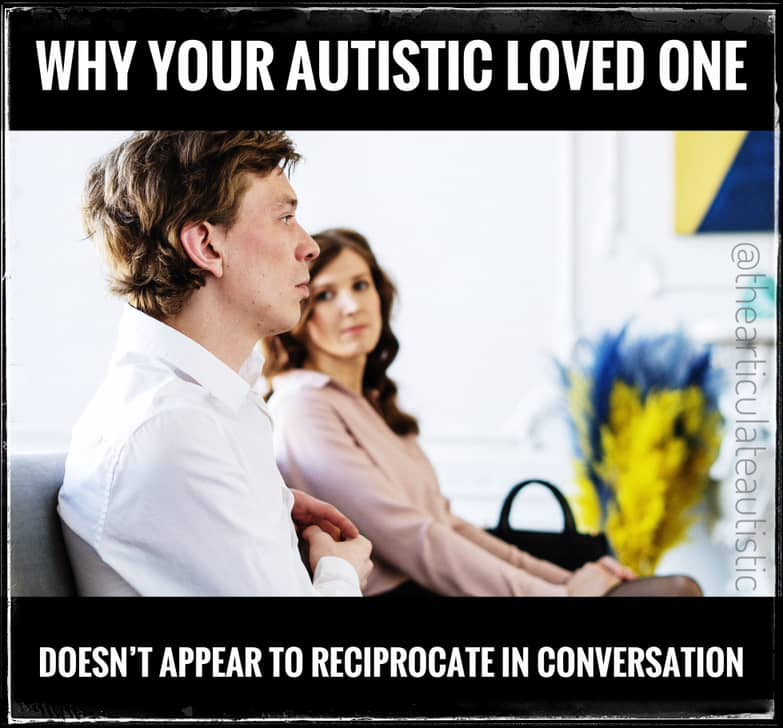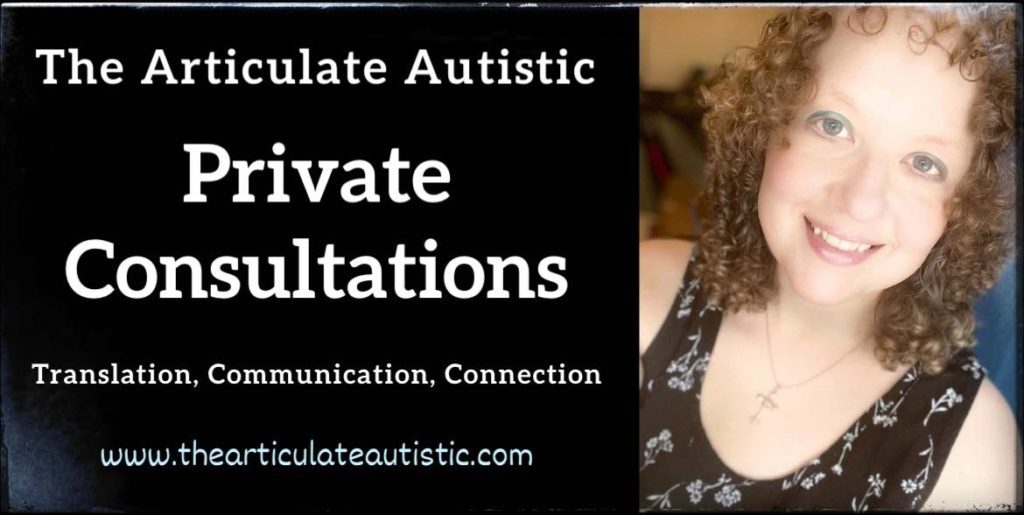Why Your Autistic Loved One Doesn’t Appear to Reciprocate in Conversation

I watched a video a few years ago that still sticks with me because it broke my heart and reminded me of so many unfortunate social situations I’d also once found myself in. In this video, a young, autistic woman was upset and confused because her friend had suddenly dumped her after being angered by one of their text conversations. She had no idea what had happened, and she turned to social media to vent her feelings of hopelessness and confusion.
Her experience went something like this:
Neurotypical Friend (expecting a conversation to start): “Hope all is well with you and yours!”
Autistic Friend (unaware of expectation): “Everything’s great! Thanks!”
Neurotypical Friend (hurt): “You know what? I’m done trying! All you do is care about yourself!”
Autistic Friend (as shocked as if she’d been punched): “What???”
Neurotypical Friend (angry): “You can’t even be bothered to ask me how I am?? I see how you are!”
Autistic Friend (frantically reading through the exchange to try to decipher what social cue she missed): “I don’t understand. What do you mean??”
Neurotypical Friend (exasperated): “There’s no reciprocity in our friendship!”
Autistic Friend (having a panic attack): “I don’t understand!”
Neurotypical Friend (done trying): “We’re done here.”
I’ve been the autistic friend in this situation too many times. One minute, everything is fine, the next, a friend is blowing up at me, and I can’t even process what happened. It’s so shocking, it’s like the roof of my house fell in.
If you’re the neurotypical friend in this scenario, allow me to explain what’s happening from our perspective.
Making a Statement vs Asking a Question
The neurotypical friend began his attempt to connect with a statement, “Hope all is well with you and yours!” The autistic friend took the words and responded to them at face value. Most autistic people are very literal. For us, there is no subtext, only the literal meaning of words. When someone makes a statement, we respond to it as if it is only a statement, not a subtle request for something more. We’re not messing with you. That’s just how our brains work.
The autistic friend responding with, “Everything’s great! Thanks!” is a literal response to a literal statement. It’s not self-centeredness. There’s no hidden agenda. There’s no attempt to hide or evade. Again, it’s simply a literal response to a literal statement.
Now, had the friend started the conversation with, “How are you and your family doing?”, the autistic person may still have responded with, “We’re going great! Thanks!”
The neurotypical person in this situation may still not make the social connection they are hoping for because there is a second layer to this common inter-neurotype misunderstanding that can complicate things.
Let’s break that down.
Autistic People Just Volunteer Information, We Don’t Wait for a Prompt
While asking a direct question of an autistic person will almost certainly get you a direct answer, the conversation may still not continue in the way you expect because autistic people tend to volunteer information without needing or expecting to be prompted!
When a neurotypical person asks another neurotypical person how their family is doing, they’ll usually get an answer followed by a quick and expected follow-up of the same question. This is how neurotypical people show reciprocity and interest.
However, that’s not usually how autistic people communicate with one another. If an autistic person asks another autistic person how they’re doing, the other autistic person will respond, and the first autistic person will then volunteer information about their own life, unprompted!
For many of us autistic folks, it’s also perfectly ordinary to talk about 5 different, seemingly-unrelated topics simultaneously, all over top of each other, brimming with excitement, pausing to let the other speak, interrupting again, apologizing, laughing, and exchanging information at what looks like lightning speed.
No prompting, no waiting to be prompted, just a buzz of delightful, mutual exchange. This is how autistic people show reciprocity and interest!
So, if you ask the question, “How is your family doing?” to an autistic person, you may be waiting for them to ask you in kind, while they’re expecting you to just tell them, unprompted. For you as a neurotypical person, just telling someone without a prompt feels rude, but to us, it feels just as foreign to ask. We figure if you have something to say, you’ll say it, because that’s how WE communicate.
It’s a misunderstanding on both sides, and neither party is trying to be difficult. It’s just a matter of different communication styles!
The Effect of Poor Working and Short-Term Memory
Another reason you may feel as though your autistic loved one is not reciprocating in conversations is that they have a poor working and/or short-term memory. As a person who is both autistic and ADHD, my memory is terrible. Everything that is out of sight is also out of mind.
For example, if you’re telling me about your upcoming surgery, a job you lost, or your grandfather’s funeral plans, I will fully be with you and care deeply in the moment, but my brain simply won’t allow me to remember your concerns much beyond the duration of the conversation. The information will just slide right out of my head, and I won’t remember it anymore.
Since the information has slid out of my brain as though we’ve never discussed it, I won’t follow up with you in a week or two to see how you’re doing. It’s not that I didn’t care deeply in the moment or that I don’t care about you overall, I just won’t remember.
If your neurodivergent loved one has a poor memory, don’t wait for them to contact you. They won’t remember to, and you may end up building misplaced resentment towards them. Instead, be the first to reach out with specifics that will help jog their memory. Such as, “Hey, I just got out of wrist surgery for my carpel tunnel. I have to rest it for a few weeks, but the doctor says everything looks good.”
Hint: “I just got out of surgery” may not be enough information for an autistic person with a very poor memory, and it may also incite panic rather than the connection or empathy you’re seeking because, for them, it sounds like you’re telling them for the first time, and you’ve just had an unexpected emergency. Their reaction of “Oh, my God! Are you OK?? What happened??” may seem and feel out of proportion or even sarcastic, but if they genuinely don’t remember, that’s the response you may get!
Since you won’t want to explain yourself all over again after just getting out of surgery, just lead with the details to avoid confusion, frustration, and panic.
The Effect of Time Blindness

As an autistic/ADHD person, I’m also time blind. I honestly can’t tell the difference between a week, a month, or a season going by between my interactions with another person. If I do manage to remember you have an important upcoming event in your life, I can virtually guarantee that unless I have it stored on a reminder app where it pops up right in my face, I’ll think it hasn’t happened yet.
Then, 3 months down the line, when you post an update about said event on your social media, I’ll gasp aloud like I’ve been underwater for minutes because all the information will come flooding back to me in glaring clarity. I’ll feel terrible in the moment and then consider texting you about it, but I won’t because it might irritate you that I’ve “waited” (I wasn’t waiting, I forgot) so long. Then, I’ll forget again and carry on.
That’s just the reality of my brain, but it doesn’t speak for my heart or intentions.
If your neurodivergent loved one also struggles with time blindness, it doesn’t mean they don’t care, they just need reminders.
How to Have More Effective Conversations With Your Autistic Loved One
- Be Specific
If you want to talk with your autistic loved one, be specific in your intentions and your approach. Remember, “Hope all is well” is a statement, not a question. Also, even “How are you?” can be too general of a question for an autistic person’s mind to make sense of. It’s not that we’re slow, it’s that the question feels too vague. Our brains may go into overdrive trying to decipher what you mean. “How am I how? In what way? How is work going? How are my studies going? How’s my family? My dog?”
Vague questions can send your autistic loved one into a tailspin, especially if they have also experienced being told over and over again that they’re responding in the “wrong” way.
Instead, be very specific. “Hey. Did you ever end up seeing that horror movie you were talking about?” or “How’s Spike doing? I know you had to take your dog to the vet for an ear infection. Is he feeling better?”
- Volunteer Information
After you’ve asked your on-topic question and a few follow-up questions, don’t wait for a prompt from them, try volunteering relevant information instead. “Speaking of horror movies, have you seen ________?” or “Yeah, Slinky had an ear infection once. Thought I was gonna lose the poor ferret!”
- Share Videos, Memes, Etc.
If asking questions doesn’t seem to get you the response you’re expecting, try sharing videos or memes relevant to your autistic loved one’s passionate interests. Those can be great ice-breakers. However, if you’re looking to talk about something beyond that, be specific and direct. Otherwise, the autistic person will likely respond only to the video or meme without thinking to ask any follow-up questions.
Important Note: Do not send videos or memes as “bait” to draw your autistic loved one into a conversation. It’s great to get a cute video, but when it’s followed up by something ominous like, “Haven’t heard from you in a while” or “Oh, so you respond to cute videos but not my phone calls”, you’ll immediately activate my fight-or-flight response, and if you do it enough times, I’ll block you as that type of underhanded and passive-aggressive approach makes me no longer trust you.
- Schedule Times to Catch Up
Another way to reduce anxiety and be clear about your expectations and needs is to schedule a specific time and date to catch up with “rain” dates scheduled in. This way, both parties know to set aside time to catch up, but there’s no pressure or admonishment if the first or second appointment doesn’t pan out.
It’s important to keep in mind that autistic people are often anxious people because we’ve lived our whole lives in a neurotypical world not made for us, irritating and offending people along the way, being suddenly yelled at without knowing why, and being corrected dozens of times a day for the way we simply exist in the world.
It makes us wary, distrustful, and exhausted. Please be patient.
- Stop “Keeping Score”
I’ve saved my best piece of advice for last. Stop “keeping score”. What I mean by this is, if you’ve texted your autistic loved one two or three times, and you’ve decided to stop initiating because your autistic loved one never initiates, that may be the last time you ever talk to them.
Remember, reciprocity for an autistic person doesn’t look the same as it does for a neurotypical person, and that’s OK. Both types of communication are valid, and neither party is purposefully slighting the other.
If you, as a neurotypical person, apply the same social rules to an autistic person, you’re going to end up jumping to conclusions that just aren’t true. You’re also going to build up resentment over a story you’ve told yourself about that person and their intentions. Meanwhile, the autistic person will be none the wiser and won’t have a clue why you, for example, make points to avoid them out in public.
You may think you’re making a bold and pointed statement by doing something like that, and that your target is well aware of what they did to offend you, but I promise you, they aren’t. The autistic person isn’t being “properly chastised” for their perceived social slight, they’re just, once again, being mistreated and abandoned for reasons they can’t fathom.
Reasons people consistently refuse to explain to them.
The Takeaway
To enjoy more reciprocal and effective communication with your autistic loved one, be the first to reach out, get accustomed to “no” (we may not have the energy or emotional bandwidth to talk), be specific, offer reminders, volunteer information, don’t try to trick us, don’t jump to conclusions, ask, don’t assume, and never keep score.
Download PDF of this article on Patreon.
Need some personalized help? I now offer private consultations!





What I struggle w is the following: social norms are social norms. Heaven knows where they come from, and they do differ greatly from culture to culture, but I have a hard time explaining “why” bc that’s the way I was socialized, plainly – I don’t necessarily actively think they make sense, or see any inherent value in them. Do you think this is valid? Like understanding ppl identifying as ND as just being particularly confused or stressed by something (for example “politeness”) that does, to a certain extent, stress everyone else too?
My partner often feels like I psychologize her bc I think we’re in a neurodiverse rs. Most of what you write describes dynamics sometimes coming up between us. But after we were commenting on some ADHD videos (which she does think she might be) on IG, she’s said v valid things like, everyone is diff anyways, and where are the videos explaining YOUR thoughts/mechanisms/behavior to me? I’ve actually tried to research this but there seems to be nothing out there pretty much (pls correct me if you do know literature that turns the whole “explaining” around). I’ve gone as far as wondering, maybe at least literature exists explaining different cultural norms v specifically (like idk, between Japan and Spain or whatever)?
So when I read sentences of yours like “You may feel you’re making a bold and pointed statement…” my heart really bleeds bc why do you even have to be in a position where you’re an expert on how mechanisms that are completely foreign to you work, it’s really unfair. How is anybody supposed to know that anybody else is “structurally” misunderstanding them, and why should this be expected.
But the truth is, I’m also often wary, distrustful and exhausted myself, bc the translation effort does go both ways. And I have a hard time explaining why I’d intuitively “expect” whatever, bc social norms are not necessarily logical. I hope this doesn’t sound like an excuse, I often feel truly lost in this.
Nah, it doesn’t sound like an excuse. It sounds like you’re frustrated and lost. And, you shouldn’t automatically know that you’re having a functional communication issue. We autistic folk don’t know, either. We’re not even aware of what’s happening until it’s too late, and people are screaming at us. This is the difficult part. This is the painful part. Translation helps (I offer translation services if either of you are interested), but it takes time to really know and understand each other based on the new parameters that enter into a relationship once you both realize you haven’t been speaking the same language. For her, recommend the book, “A Field Guide to Earthlings”. It’s the only one I know of that “reverse translates”, and it changed my life!
If you’d like to book a private translation session, you can do so by clicking the link here: https://www.thearticulateautistic.com/private-consultation-translation-autistic-adult/
Thank you for taking time to answer, this really made my day! 💜
Lovely article. As an autistic, this greatly helped me learn more about my own behavior and feel less selfish. I feel a little more confident explaining to people too and understanding how this miscommunication can occur.
I appreciate your points here. I have brought up so many times to my partner that I feel invalidated and ignored constantly. She refuses to start conversation when I try to talk to her, she refuses to have any back and fourth. She refuses to validate me or to acknowledge when I speak to her. 90% of the time that I speak I feel like I am just talking to an empty room. I have told her so many times its important to me. I am AuDHD too, so, I get it. But she says “oh i just dont know how to respond” and I say ANYTHING!!! look at me and smile, a grunt of understanding, a question, an “oh ya?”. LITERALLY ANYTHING to make me not feel like I am worthless – it is a huge trigger of mine as my family constantly ignored me. I have made it so clear how important this is to me and she WILL NOT WORK ON IT. At what point do you stop telling yourself its just their autism and accept that they just arent willing to put effort into your relationship to make you feel seen and important in your own home?
I’m sorry that’s happening, Ash. I can see where it would be frustrating. Maybe I can help you both? I offer private consultations for autistic people and their loved ones to translate and troubleshoot communication difficulties. Here’s the link: https://www.thearticulateautistic.com/private-consultation-translation-autistic-adult/
It’s so hard to find good helpful information for adults with autism. Everything’s geared for children, with the assumption that “you’ll grow out of it” and if you don’t, you’re on your own. Well I’m in my early 60s now and guess what? I haven’t “grown out of it.”
Discovering I was autistic (when someone showed me a web page about Asperger’s Syndrome about 15-20 years ago or so) was an eye-opening experience and it’s been a journey ever since. Self-diagnosed but most health professionals say “yep” and just go with it. (Getting an actual clinical diagnosis is virtually impossible: they want insurance, they want to see you for a course of “treatment”, not just diagnose you and let you walk out the door with it, etc.) 🙂 I went through a lot of these issues in communication with my late wife, who had mental health problems but did not understand autism. At. All. :/
I still have to remember to talk to people the way they expect rather than how an autistic would talk, I have to remember to “say the pleasantries” or I’ll offend them, and so on. A daily struggle but at least I know who and what I am now.
Excellent article! I will refer my clients to read this, as it has helped me immensely in understanding my communication style and past experiences. Thank you!
On the topic of memory, my working memory will also drop the question you asked in hopes of reciprocation. “How are you?” will get a literal, rambling response, and my brain is fully engrossed by whatever topic it’s led to. I won’t remember that a reciprocal “how are you?” was expected until the convo replays in my head hours later, whereupon I melt into a puddle of cringe soup.
Same
Wow, marvelous blog format! How lengthy have you ever been running a blog for?
you make blogging glance easy. The entire glance
of your site is excellent, as well as the content material!
You can see similar: sklep internetowy and here ecommerce
100% accurate description of what happens to me and my aspie guy friend. This is excellent advice thanks. I really was hoping this is true because otherwise I feel like he doesn’t care. But when I give him time I can tell he does care. I do feel like I initiate more texts and he likes to send videos and memes. I have noticed him asking me when an event is and putting into his phone so he will remember when it’s important. So, I just lost a job and his response was “damn” without follow up and I was floored like that’s it? So i sent more info about it and he then gave some helpful support. I suspect when I see him in a month he will say something like “i was worried about you”. Reading this article reminded me he cares but won’t verbalize it always. Makes it hurt less.
My autistic friend will be 100% contact, messages/calls etc several times a day then disappears, when asked “is everything OK?” I get “Yes, hope you are OK too” then when challenged about feeling ignored he says he’s having a break from technology etc. This happens in cycles maybe once every couple of months, next week he’ll be back 150% and won’t get why I’m hurt.
Kathy, not to be blunt, but *I’m* not sure I get what you’re hurt, either. I mean, to be fair, you have every right to any emotion. It’s not so much that, it’s that you’re surprised or hurt by something you’ve been experiencing for a while now. If you know this is how your friend is, I’m surprised it still surprises you. Maybe your friend really *is* taking a break from social media/technology. Maybe that’s what he needs to decompress and come back to be the friend you need. The thing is, if it really hurts you, this might not be the friendship for you. Because it’s similar to being hurt that someone is colorblind and can’t notice and compliment you on your new red dress. The colorblindness never goes away, and neither does the autism. It’s just something to consider. You’re expecting traits from a person who doesn’t have those traits, and consistently. I think you should ask yourself why.
This is helpful info as I learn increasing amounts of info about my tendencies/ challenges that have always been with me but I couldn’t make sense of much of it and certainly couldn’t explain “it” to others in a way they could understand, believe or respect (late diagnosed auDhd at age 54). It’s been a very difficult, lonely journey and I’ve normalized a lot of things that should never be normalized, so thank you!